W hat a delightful thing rest is! The bed has become a place of luxury to me. I would not exchange it for all the thrones in the world. Napolon Bonaparte | Cycles, Naps, Dreams, and Nightmares |
A good nights sleep should be declared a basic human right. Research is growing nearer to establishing the purpose of sleep. For example, Robert Stickgold (1998), reviewing studies on sleep and memory, points out that among rats, sleep deprivation prevents memory formation. This chapter reviews findings that may be helpful in understanding both what a good nights sleep is and how we can manage to get one.
The infant averages 14 hours of sleep, the mature adult 7 hours, and the senior adult (over 75) averages 6. Before the invention of electric lights, typical adults slept for 9 hours. When all cues to time of day are removed, typical adults will average 10.3 hours of sleep daily, similar to their cousins, the apes and monkeys. However, studies show that the length of sleep is not what causes us to be refreshed upon waking. The key factor is the number of complete sleep cycles we enjoy. Each sleep cycle contains five distinct phases, which exhibit different brain wave patterns (see more in chapter 2):
Pre-sleep: beta waves, or normal alertness.
Phase 1 sleep: alpha waves, the mind at rest, eyes closed, breathing slowed, images beginning to appear; these images can be voluntarily controlledyou are at this point still conscious.
Phase 2 sleep: theta waves, or light sleep.
Phase 3 sleep: delta waves, or deep sleep.
Phase 4 sleep: rapid eye movement (REM) sleep, or dreaming.
Phase 5 sleep: theta waves, or light sleep, signaling the end of a cycle.
Phases 13 together average 65 minutes, followed by an average of 20 minutes for phase 4 (REM) sleep, with phase 5 lasting only 5 minutes on average. For a complete description, see The Mind in Sleep (Arkin, Antrobus, and Ellman, 1978) or Sleep: The Gentle Tyrant (Webb, 1992). For our purposes, it suffices to say that one sleep cycle lasts an average of 90 minutes (see figure 16.1).
Figure 16.1. The Sleep Cycle
If we were to sleep completely naturally, with no alarm clocks or other sleep disturbances, we would wake up, on the average, after a multiple of 90 minutesfor example, after 4 hours, 6 hours, 7 hours, or 9 hours, but not after 7 or 8 hours, which are not multiples of 90 minutes. In the period between cycles we are not actually sleeping; this is a sort of twilight zone from which, if we are not disturbed (by light, cold, a full bladder, noise), we move into another 90-minute cycle. A person who sleeps only four cycles (6 hours) will feel more rested than someone who has slept for 810 hours but who has not been allowed to complete any one cycle because of being awakened before it was completed. Within a single individual, cycles can vary by as much as 60 minutes from the shortest cycle to the longest one. For example, someone whose cycles average 90 minutes might experience cycles that vary in length from 60 to 120 minutes. The standard deviation for adult length of sleep is 1 hour, which means that roughly two-thirds of all adults will sleep between 6 and 8 hours, based on an average of 7 hours.
A friend once told me, All this stuff about cycles is a bunch of bunk. I wake up every morning when the sun rises. After talking about his sleep patterns, he discovered that he was self-disciplined in such a way that his bedtime was consistently about 7 hours before sunrise. He was waking between cycles, and the song of a bird, the cry of a baby, or the pressing of a full bladder could have been equally as effective as the sunrise in waking him. All it takes to awaken someone between cycles, especially if he has had sufficient sleep, is a gentle stimulus.
When my alarm goes off during the last half of my cycle, for a few hours I feel as if a truck has hit me. When it goes off during the first half of my cycle, it is like waking after a 15- to 20-minute nap, and I feel refreshed. Our motor output system from the brain is completely shut down during REM sleep; that is why we dream we are moving but dont actually move and why we feel so lifeless when we wake during REM sleep. Our motor output system hasnt kicked back in yet!
Applications
 Keep a sleep journal. Record the beginning and waking times for each natural sleep episode that is uninterrupted by an alarm or any other disturbance. Find the common multiple. For example, if your recorded sleep periods were 400, 500, 400, 200, and 700 minutes, the common multiple is 100, so you would conclude that your personal sleep cycle typically lasts for 100 minutes, or about 1.6 hours.
Keep a sleep journal. Record the beginning and waking times for each natural sleep episode that is uninterrupted by an alarm or any other disturbance. Find the common multiple. For example, if your recorded sleep periods were 400, 500, 400, 200, and 700 minutes, the common multiple is 100, so you would conclude that your personal sleep cycle typically lasts for 100 minutes, or about 1.6 hours.
 Once you know the length of your typical sleep cycle (if you havent kept a journal, you might assume 90 minutes), then, where possible, plan your waking accordingly. For example, my cycle is 90 minutes. If I am ready for bed at 11:00 P . M . and I know that I must rise at 6:00 A . M . in order to make a 7:00 breakfast meeting, I read for about 45 minutes to avoid having the alarm go off during the last half of my cycle. Conversely, if I go to bed at midnight, I set my alarm for 6:30 A . M . and rush to get ready, rather than being interrupted toward the end of my fourth cycle.
Once you know the length of your typical sleep cycle (if you havent kept a journal, you might assume 90 minutes), then, where possible, plan your waking accordingly. For example, my cycle is 90 minutes. If I am ready for bed at 11:00 P . M . and I know that I must rise at 6:00 A . M . in order to make a 7:00 breakfast meeting, I read for about 45 minutes to avoid having the alarm go off during the last half of my cycle. Conversely, if I go to bed at midnight, I set my alarm for 6:30 A . M . and rush to get ready, rather than being interrupted toward the end of my fourth cycle.
 In support of waking naturally, William Moorcroft, professor emeritus at Luther College, reported that if we get the same amount of sleep each night, we dont really need an alarm clock, except as a backup ( Sleep, January 1997). Subjects who were asked to visualize their time of waking on an imaginary clock face were generally able to rise at the desired time without an alarm. The key techniques: get the same amount of sleep nightly, choose your own time, visualize before sleep onset, and use a backup (a clock set 15 minutes later than your target rising time).
In support of waking naturally, William Moorcroft, professor emeritus at Luther College, reported that if we get the same amount of sleep each night, we dont really need an alarm clock, except as a backup ( Sleep, January 1997). Subjects who were asked to visualize their time of waking on an imaginary clock face were generally able to rise at the desired time without an alarm. The key techniques: get the same amount of sleep nightly, choose your own time, visualize before sleep onset, and use a backup (a clock set 15 minutes later than your target rising time).
 We all are awake between cycles. However, most of us are not aware of this, because we go straight into the next cycle. When we wake up during the night, it is because some sensory stimulus (e.g., cold, heat, noise, or light) has penetrated our consciousness between cycles. It only appears that our sleep has been disturbed, when in fact we were not asleep at all. Many people worry about these interruptions of sleep. Dont. Realize that being awake between cycles is perfectly normal, and just surrender to your next cycle. As we age, it is even more common to be aware of being awake between cycles. Again, dont let it cause worry, as it is perfectly normal.
We all are awake between cycles. However, most of us are not aware of this, because we go straight into the next cycle. When we wake up during the night, it is because some sensory stimulus (e.g., cold, heat, noise, or light) has penetrated our consciousness between cycles. It only appears that our sleep has been disturbed, when in fact we were not asleep at all. Many people worry about these interruptions of sleep. Dont. Realize that being awake between cycles is perfectly normal, and just surrender to your next cycle. As we age, it is even more common to be aware of being awake between cycles. Again, dont let it cause worry, as it is perfectly normal.
 For an intriguing description of the biology of sleep, see chapter 5 of John Medinas book The Genetic Inferno (2000).
For an intriguing description of the biology of sleep, see chapter 5 of John Medinas book The Genetic Inferno (2000).
Cornell University professor of psychology James B. Maas (in Power Sleep, 1998) says sleeping less than a normal nights sleep (e.g., slavishly obeying an alarm clock) negatively affects energy, performance, memory, learning, thinking, alertness, productivity, creativity, safety, health, longevity, and quality of life.
Maas stresses the importance of REM sleep, most of which occurs during the later hours of a nights sleep. Without REM sleep, we lose what we have learned the day preceding sleep. The specific mechanism by which REM sleep transforms experience into long-term memory is the sleep spindle. A 1- to 2-second outburst of brain waves at extreme frequencies, a sleep spindle serves (1) to transport memories in the form of neural patterns to the hippocampus, and (2) to resupply ones system with neurotransmitters used up during the previous day. Without REM sleep and this spindling process, memories dissipate. So if you spend good money learning a new tennis stroke and fail to get a natural nights sleep afterward, Maas says it is like having never had the lesson. You may remember the elements of the new stroke from an academic perspective, but the absence of spindling fails to convert the motor neural patterns into long-term memory.
Next page
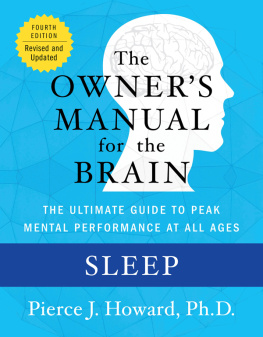


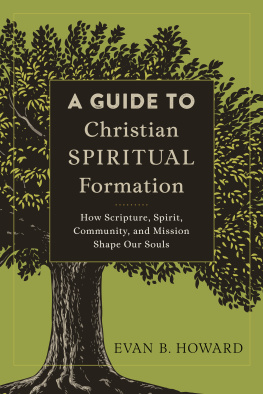



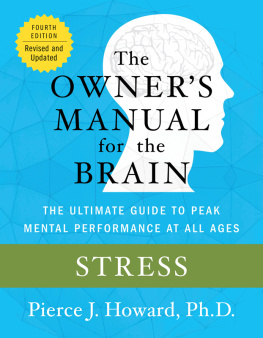
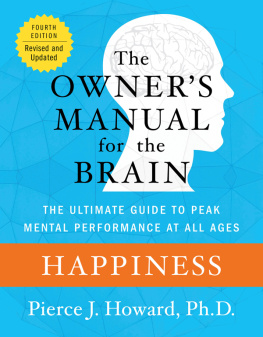

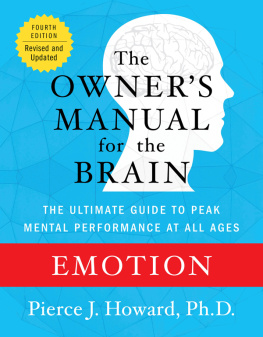
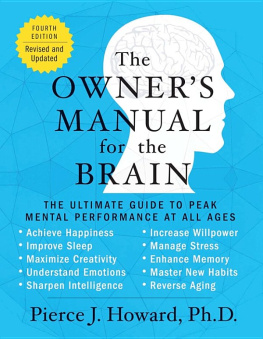
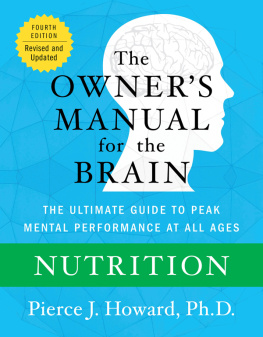
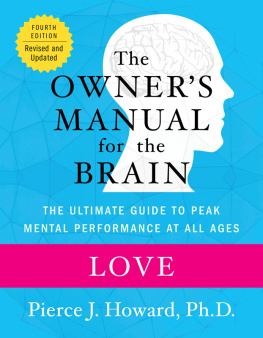
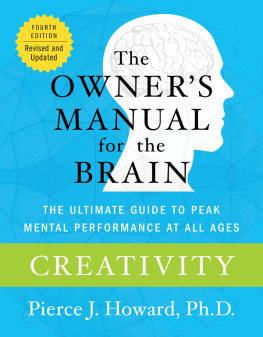
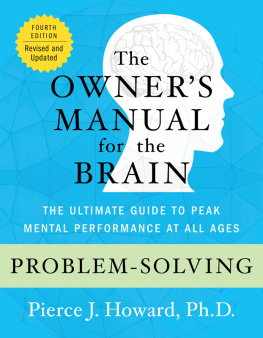

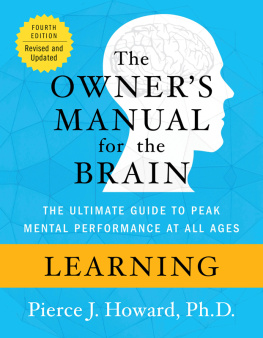
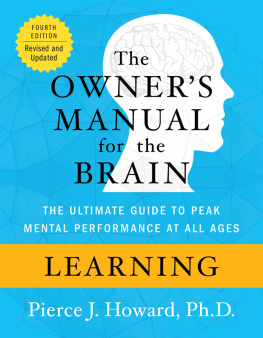
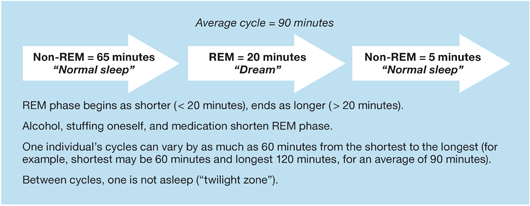
 Keep a sleep journal. Record the beginning and waking times for each natural sleep episode that is uninterrupted by an alarm or any other disturbance. Find the common multiple. For example, if your recorded sleep periods were 400, 500, 400, 200, and 700 minutes, the common multiple is 100, so you would conclude that your personal sleep cycle typically lasts for 100 minutes, or about 1.6 hours.
Keep a sleep journal. Record the beginning and waking times for each natural sleep episode that is uninterrupted by an alarm or any other disturbance. Find the common multiple. For example, if your recorded sleep periods were 400, 500, 400, 200, and 700 minutes, the common multiple is 100, so you would conclude that your personal sleep cycle typically lasts for 100 minutes, or about 1.6 hours. Once you know the length of your typical sleep cycle (if you havent kept a journal, you might assume 90 minutes), then, where possible, plan your waking accordingly. For example, my cycle is 90 minutes. If I am ready for bed at 11:00 P . M . and I know that I must rise at 6:00 A . M . in order to make a 7:00 breakfast meeting, I read for about 45 minutes to avoid having the alarm go off during the last half of my cycle. Conversely, if I go to bed at midnight, I set my alarm for 6:30 A . M . and rush to get ready, rather than being interrupted toward the end of my fourth cycle.
Once you know the length of your typical sleep cycle (if you havent kept a journal, you might assume 90 minutes), then, where possible, plan your waking accordingly. For example, my cycle is 90 minutes. If I am ready for bed at 11:00 P . M . and I know that I must rise at 6:00 A . M . in order to make a 7:00 breakfast meeting, I read for about 45 minutes to avoid having the alarm go off during the last half of my cycle. Conversely, if I go to bed at midnight, I set my alarm for 6:30 A . M . and rush to get ready, rather than being interrupted toward the end of my fourth cycle. In support of waking naturally, William Moorcroft, professor emeritus at Luther College, reported that if we get the same amount of sleep each night, we dont really need an alarm clock, except as a backup ( Sleep, January 1997). Subjects who were asked to visualize their time of waking on an imaginary clock face were generally able to rise at the desired time without an alarm. The key techniques: get the same amount of sleep nightly, choose your own time, visualize before sleep onset, and use a backup (a clock set 15 minutes later than your target rising time).
In support of waking naturally, William Moorcroft, professor emeritus at Luther College, reported that if we get the same amount of sleep each night, we dont really need an alarm clock, except as a backup ( Sleep, January 1997). Subjects who were asked to visualize their time of waking on an imaginary clock face were generally able to rise at the desired time without an alarm. The key techniques: get the same amount of sleep nightly, choose your own time, visualize before sleep onset, and use a backup (a clock set 15 minutes later than your target rising time). We all are awake between cycles. However, most of us are not aware of this, because we go straight into the next cycle. When we wake up during the night, it is because some sensory stimulus (e.g., cold, heat, noise, or light) has penetrated our consciousness between cycles. It only appears that our sleep has been disturbed, when in fact we were not asleep at all. Many people worry about these interruptions of sleep. Dont. Realize that being awake between cycles is perfectly normal, and just surrender to your next cycle. As we age, it is even more common to be aware of being awake between cycles. Again, dont let it cause worry, as it is perfectly normal.
We all are awake between cycles. However, most of us are not aware of this, because we go straight into the next cycle. When we wake up during the night, it is because some sensory stimulus (e.g., cold, heat, noise, or light) has penetrated our consciousness between cycles. It only appears that our sleep has been disturbed, when in fact we were not asleep at all. Many people worry about these interruptions of sleep. Dont. Realize that being awake between cycles is perfectly normal, and just surrender to your next cycle. As we age, it is even more common to be aware of being awake between cycles. Again, dont let it cause worry, as it is perfectly normal. For an intriguing description of the biology of sleep, see chapter 5 of John Medinas book The Genetic Inferno (2000).
For an intriguing description of the biology of sleep, see chapter 5 of John Medinas book The Genetic Inferno (2000).